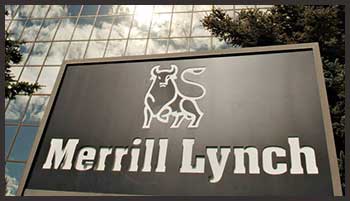When it comes to choosing a financial advisor or investing firm, two big names often top the list: Merrill Lynch and Northwestern Mutual. But what exactly sets these industry titans apart?
This comprehensive guide examines the key differences between Merrill Lynch and Northwestern Mutual to help you determine which may be a better fit.
A Brief Comparison Table
| Feature | Merrill Lynch | Northwestern Mutual |
| Investments Offered | Stocks, bonds, ETFs, mutual funds, alternatives | Mutual funds, annuities |
| Investment Approach | Broader, more aggressive | Narrower, more conservative |
| Account Minimums | $250,000+ | $50,000-$100,000 |
| Ongoing Advisory Approach | Holistic, continuous | Insurance-focused, less frequent |
| Planning Services | Extensive beyond investing | Narrower, insurance-focused |
| Average Client Assets | $2.3 million | $230,000 |
| Team-Based Guidance | Yes | No |
| Compensation Model | Commission-based | Commission-based |
| Advisory Fees | 1.0-2.7% | 1.0-1.5% |
| Proprietary Tools | Extensive research and technology | Fewer proprietary tools |
| Access to Alternatives | Yes | Limited |
Overview Of Merrill Lynch
Founded in 1914, Merrill Lynch is one of the largest wealth management firms in the world. With offices in over 40 countries, Merrill Lynch provides services like investing, banking, financial planning, and more.
Some key things to know:

- Merrill Lynch advisors can offer access to a wide range of investment products, including stocks, bonds, ETFs, mutual funds, and alternative investments.
- Banking services are provided through parent company Bank of America. This gives clients access to checking/savings accounts, credit cards, mortgages, and other banking solutions.
- Merrill Edge is the firm’s digital investing platform aimed at clients who are more self-directed. It offers lower account minimums but less personalized guidance.
- Merrill Lynch caters to high-net-worth investors, with account minimums starting at $250,000 for personalized advice. Their average client has around $2.3 million in investable assets.
Overview Of Northwestern Mutual
Founded in 1857, Northwestern Mutual is best known for its insurance products but also offers wealth management and advisory services.
Some key characteristics:

- Northwestern Mutual advisors focus heavily on life insurance, disability insurance, and annuities as part of financial plans.
- For investments, NWM advisors can offer mutual funds, ETFs, equity options, and fixed income products.
- The company takes a more conservative approach focused on preserving wealth versus maximizing returns.
- Account minimums are around $50,000-$100,000. The average client has $230,000 in investable assets according to the latest data.
Comparing The Investing Experience
When it comes to investing, the experiences at Merrill Lynch and Northwestern Mutual differ significantly:
- Investment Products and Philosophy
Merrill Lynch provides access to individual securities like stocks and bonds in addition to funds and ETFs. Their advisors may take a more aggressive investing approach to try generating higher returns.
Northwestern Mutual’s offerings center around mutual funds. Their advisors tend to have a more risk-averse approach focused on insurance products and wealth preservation.
- Research and Technology
Merrill Lynch clients benefit from the firm’s Chief Investment Office and extensive research capabilities. Advisors leverage technology like Merrill’s Wealth Outlook financial planning software.
NWM has fewer proprietary tools. While advisors can access various third-party research and technology, the experience is not as robust.
Also Read: Comparison Between Edward Jones And Northwestern Mutual.
- Account Minimums and Fees
Merrill Lynch requires at least $250,000 for an investment account with a personal advisor. Advisory account fees range from 1.0-2.7%.
At NWM, minimums for an investment account start around $50,000. Advisory fees often fall between 1.0-1.5%.
- Access to IPOs and Alternative Investments
Merrill Lynch clients may have opportunities to invest in IPOs, hedge funds, private equity, and other alternative asset classes not always readily accessible to individual investors. Availability depends on account size and investor qualifications.
NWM’s offerings focus around traditional publicly-traded investments like mutual funds. Advisor access to alternatives is more limited.
Comparing Planning And Guidance Experience
Merrill Lynch and NWM take different approaches when providing financial planning and guidance:
- Breadth of Services
Merrill Lynch provides extensive investment management, retirement planning, trust services, college savings plans, business planning, and more.
Northwestern Mutual’s offerings center heavily around risk management using insurance products. Wealth management and advisory services are secondary.
- Ongoing Guidance and Advice
At Merrill Lynch, advisors actively monitor portfolios and provide continuous advice over the long-term based on changing client needs.
NWM advisors have less frequent contact with clients after the initial insurance and investment recommendations are made. Ongoing guidance is more limited.
- Team-Based Approach
Merrill Lynch advisors often work with teams who can provide specialized expertise in areas like estates, dividends, etc.
Most NWM advisors work independently without the support of dedicated teams for complex topics.
Also Read: Comparison Between LPL Financial And Charles Schwab.
Pros And Cons Of Merrill Lynch
Pros:
- Access to a full range of investment products and alternative investments many advisors don’t offer
- In-depth research capabilities and innovative technology
- Ongoing guidance and advice from a personal advisor
- Team-based approach with specialists in areas like retirement
Cons:
- High account minimums mean Merrill isn’t accessible for everyone
- Commission-based compensation model creates potential conflicts of interest
- Higher advisory account fees compared to some competitors
Pros And Cons Of Northwestern Mutual
Pros:
- Strong focus on risk management and insurance planning
- Lower account minimums around $50k-100k
- Generally, slightly lower advisory fees than Merrill
- Longstanding reputation as a highly ethical company
Cons:
- Limited investment product shelf – no individual securities or alternatives
- Advisors sell own insurance products, creating potential bias
- Guidance can be lacking compared to more full-service firms
- Advisors may not provide adequate ongoing advice and contact
Frequently Asked Questions (FAQ)
Some reasons you may want to avoid Northwestern Mutual for investments include the limited range of investment products and lack of access to alternatives, potential advisor bias towards own insurance products Vs. a more objective recommendation, lack of robust research/planning technology, and potential for inadequate ongoing guidance compared to full-service brokerages.
Some reasons advisors may leave Northwestern Mutual include desiring the ability to offer a wider range of securities and investment products, seeking access to more research/technology resources, wanting to provide more holistic long-term financial planning Vs. a focus on insurance sales, and pursuing models with level fee compensation Vs. commission-driven pay.
Northwestern Mutual can be a good option for conservative investors who want to minimize risk and preserve wealth using products like annuities. However, clients focused on more growth-oriented investing may find the offerings and guidance lacking compared to full-service brokerages.
While a highly reputable company, Northwestern Mutual generally ranks lower than leading full-service firms like Merrill Lynch when it comes to holistic financial guidance and the breadth of investment products and services provided. Their strengths lie more in insurance and risk-management planning.
Also Read: Comparison Between T. Rowe Price And Merrill Lynch.
Conclusion
When choosing between Merrill Lynch and Northwestern Mutual, considerations include your desired investment strategy, need for ongoing guidance, account size, and preferences around fees. Individuals wanting comprehensive financial planning paired with sophisticated investing may lean towards Merrill, while those focused on risk management and insurance may favor Northwestern Mutual.
Assessing your priorities and preferences can help determine which may be a better home for your wealth management needs.
